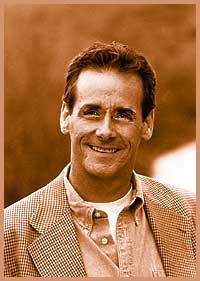He had that look. When Charles Roy looked you straight in the eye, you knew there’d be no bullshit. None from him, and none getting by him. It was the look he used when challenging colleagues to work better, when challenging politicians and bureaucrats to respond better, when coaxing funders to be more generous, when challenging friends to look after themselves better. I’m going to miss that look.
And the other look, with the twinkle in his eye. That look would signal some mischief. A tasty bit of gossip, a plan to deflate an overheated ego. He had that twinkle in his eye when a certain tobacco company made threatening noises about the AIDS Committee Of Toronto’s Condom Country prevention campaign.
“So let me get this straight,” he’d say to the tobacco lawyers. “You’re planning to sue a community-based charity that’s trying to save lives because you think our images look like ones you use to coax people into smoking. Let me know if you will be issuing a press release, because ours practically writes itself.”
Most of all, I’m going to miss the look Charles had when he was flat out happy. When a friend or colleague had a success, when ACT marked another milestone, when he went to a musical, when his favourite team won at (I’m not making this up) women’s curling. It’s the look he had on his face at the AIDS Walk two years ago, when he had his beloved dog Andy with him. There was Charles with a ridiculous little leopard-print harness carrying his equally ridiculous little chitzuo, and they both were grinning from ear to ear.
Charles Michael Roy, executive director of the AIDS Committee Of Toronto, social worker, activist, educator, mentor, confidant, friend and person living with HIV/AIDS, died from complications of HIV at the Toronto Hospital on Aug 24.
Charles had had a long string of good luck with his health since he was diagnosed with HIV in 1987, living a healthy and extraordinarily productive life. His luck started to run out about a year ago, when he began to experience cycles of coughing, fevers and exhaustion that became more acute each cycle.
This spring the illness settled in with a vengeance. A diagnoses finally came just weeks before his death: Castleman’s Disease, a rare condition similar to other HIV-related cancers. Charles’ decline was steady and unexpectedly rapid. His final period of discomfort was mercifully brief. Charles died in the company of his life partner Jay Hood and many of his close friends.
Charles was born and raised in New Brunswick. He had a tough start – look up “dysfunctional” in the encyclopedia and you’re likely to find his family photo – and didn’t have many lucky breaks along the way. His impressive achievements were the result of sheer hard work.
His academic work was focussed on the barriers and opportunities for people living with HIV/AIDS within the community-based AIDS movement. His doctoral thesis, Living And Serving, was aimed to coax AIDS organizations to become more welcoming to the participation of people with HIV.
Charles was a formidable leader in the Canadian HIV/AIDS field. Since 1996 he was executive director of ACT, following several years as director of services. He led ACT from a period of turbulence and financial peril to its current state as a stable agency with highly skilled staff, management, board and volunteers. His legacy at ACT is impossible to summarize, but here are a few highlights: He insisted on accessible services, including an on-call counsellor; he nurtured a funding development strategy to allow ACT financial stability and autonomy; he developed the Community Partners Fund so ACT’s fundraising prowess could benefit smaller partner agencies; he developed a community research department; he led development of an international partnering strategy; he supported and mentored a talented group of staff and volunteers.
Charles’ leadership went beyond his role in ACT. He had served on the board of directors of the Canadian AIDS Society where he was the founding chair of the People Living With HIV/AIDS Committee. He had also served as vice-chair on the board of the AIDS Committee Of Ottawa. Recently Charles served as an alternate community representative on the Global Fund To Fight AIDS, Tuberculosis And Malaria, an initiative of the United Nations and The World Health Organization.
Charles was direct and decisive. He could rub people the wrong way sometimes (perhaps this is the right time to mention that Charles admired my capacity for understatement), and sometimes people rubbed him the wrong way. It wasn’t always easy to predict when frictions would happen. But when Charles was ready for frictions to ease, they would be eased entirely. In his final weeks and months, he sent signals that he wanted old frictions erased, that he wanted closed doors reopened.
Many people saw Charles as a confident, assured and perhaps even arrogant man. Those of us who were allowed inside the door saw much more. For much of his life, Charles had fragments of doubt about whether he had earned people’s respect and love. I’m really happy to say that those doubts eased in his final weeks and months.
Charles was a powerful force in my life. I’ll find the challenges of life more daunting without his friendship and advice. But I’ll continue to rely on the advice I know he’d offer: Keep fighting against AIDS and for social justice; always work ethically; be bold and imaginative; and look after yourself and your friends. It’s good advice, and I’ll try to live up to it.
* Glen Brown has been active in a number of HIV/AIDS organizations over the past 15 years. His friendship with Charles Roy began in 1990 when they both served on the board of the Canadian AIDS Society.

 Why you can trust Xtra
Why you can trust Xtra


